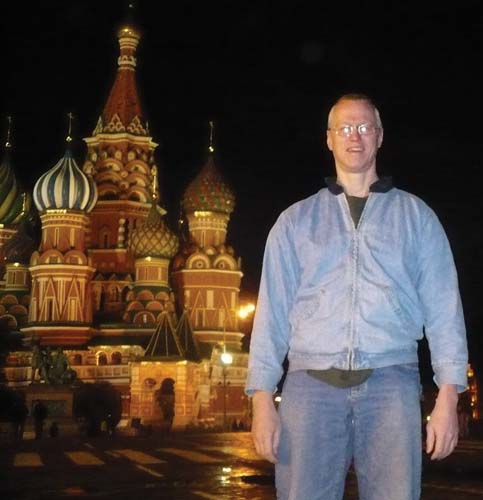Chicago gay activist Andy Thayer, of Gay Liberation Network, was in Moscow recently, for a May 16 event that Russian gay-rights activists planned as Moscow Pride. In Russia, gay-related events have been stalled by repressive state policies that do not permit citizens to rally in public, and by what many consider to be a climate of widespread social and political homophobia.

Nikolai Alexeyev, a Russian gay activist had appeared in Chicago’s October 2007 Mathew Shepard rally. This year, he invited Thayer and the British gay activist Peter Tatchell to support Moscow Pride efforts. Windy City Timesspoke to Thayer for his version of the events that transpired that day, and his thoughts on the road ahead for Russian gay activists.
Asked why he chose to go to Moscow, Thayer said that he felt the need to express “solidarity with our Russian friends.” According to him, Nikolai Alexeyev, the primary organizer of the event and a gay-rights activist, extended an invitation to “international folks he knew would help raise the profile of the event for the international press.” According to Thayer, the organizers also felt that having activists from abroad would provide a measure of protection, since the Russian government might potentially be embarrassed about the news of any repression of foreign nationals from the U.K. and U.S.
Thayer said that he was impressed with the Russians’ methods of demanding rights because “they engage in the kind of direct action we don’t engage in here. In the West, we LGBTs are complacent about what we’ve achieved. Our activists tend to be self-satisfied, and busy collecting salaries in NGOs, instead of doing what we need to do. We feel that our rights will come about by working with or asking politicians for our rights. But unless you put their feet to the fire, we’re not going to get anything.”
Thayer pointed out that Russian gay- and human-rights activists are facing the lack of the basic right to assemble. In terms of gay rights, there is a lack of support for AIDS, and a lack of LGBT-affirming education in schools.
On the day of the action, according to Thayer, “We knew something was up when we saw an abrupt change of plans. Instead of going into the city via commuter train, we piled into a van to avoid the police cordon we heard was waiting for us. This was a message that the organizers of gay pride in Russian live in a semi-police state.” Thayer said that the ability to change plans so quickly and still perform the action was a testament to the tactical prowess of the Russian gay organizers.
Once there, a group performed a rolling action “with different activists revealing themselves en route to news media.” The AP reported approximately 30 protestors, as did Al-Jazeera. Thayer says that, by his estimation, there were about 70, and that over 30 were eventually arrested. Thayer was initially stopped by Russian police, who asked him for identification. When he showed them his U.S. passport, according to him, they let him go since theydid not want to deal with me” (as the holder of a U.S. passport) . Thayer then returned to the demonstration, and was arrested.
Thayer, Tatchell and a group of Belarusians and Russians were held in a large police processing room, but people (key organizers) like Alexeyev “were grilled for nine hours without attorneys, faced slurs, treated badly, and detained overnight with no sleep.” Thayer said that “ [i] t speaks to the courage of Russian LGBT organizers that they braved the violence and political repression.”
What was the public response to the action? Thayer acknowledged the context in which the Pride action came about: “Many Russians are just trying to survive. They’re not upset about LGBT rights. You are not going to get support from non-LGBT citizenry in Russia. Over time the bigots will be forced to acknowledge the courage of LGBT citizens, especially with the weight of international attention.”
According to Thayer, the next Slavic Pride event is to be held in Minsk, Belarus, in May 2010. As for Nikolai Alexeyev, a court date has been set for May 26. Thayer said that even Alexeyev’s attorney had been barred from the hearing on the day after his arrest.